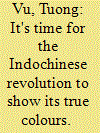| Srl | Item |
| 1 |
ID:
090702


|
|
|
|
|
| Publication |
2009.
|
| Summary/Abstract |
Cold War historians have neglected the significance of the year 1948 for Indochina. Based on new sources, this paper shows critical shifts in politics within the Vietnamese nationalist movement in 1948. These were the result of converging developments during late 1947 and early 1948, including changes in international politics, in French-Vietnamese relations, and in the relationship between non-communist and communist leaders within the Vi?t Minh state. By late 1948, Party ideologues were already looking beyond national independence towards building a new socialist regime. The nationalist coalition that had led the Democratic Republic of Vietnam (DRV) was seriously damaged in 1948, even though civil war would only break out several years later. As elsewhere in Southeast Asia, 1948 thus marked a new period: the beginning of the end of the 'united front' period and cooperation with bourgeois nationalists.
|
|
|
|
|
|
|
|
|
|
|
|
|
|
|
|
| 2 |
ID:
092232


|
|
|
|
|
| Publication |
Stanford, Stanford University Press, 2008.
|
| Description |
xviii, 455p.
|
| Standard Number |
9780804761529
|
|
|
|
|
|
|
|
|
|
|
|
Copies: C:1/I:0,R:0,Q:0
Circulation
| Accession# | Call# | Current Location | Status | Policy | Location |
| 054598 | 320.0959/KUH 054598 | Main | On Shelf | General | |
|
|
|
|
| 3 |
ID:
141046


|
|
|
|
|
| Summary/Abstract |
A new perspective has begun to challenge both the conventional portrayal of the Vietnamese revolution and the communist account of its success. This essay takes stock of new research that presents revolutionary Vietnam in a more complex and less triumphal way. It is argued that Vietnam's nationalist revolution (1945–46) should be conceptually distinguished from the subsequent socialist revolution (1948–88). The former had a distinctly urban and bourgeois character, was led by a coalition of the upper and middle classes, and lacked ideological intensity. The latter was imposed from above, based on socialist visions, and dependent on foreign assistance. The failure to disentangle the two revolutions in existing narratives assigns little agency to Vietnamese actors and leads to triumphs being exaggerated while tragedies are overlooked.
|
|
|
|
|
|
|
|
|
|
|
|
|
|
|
|